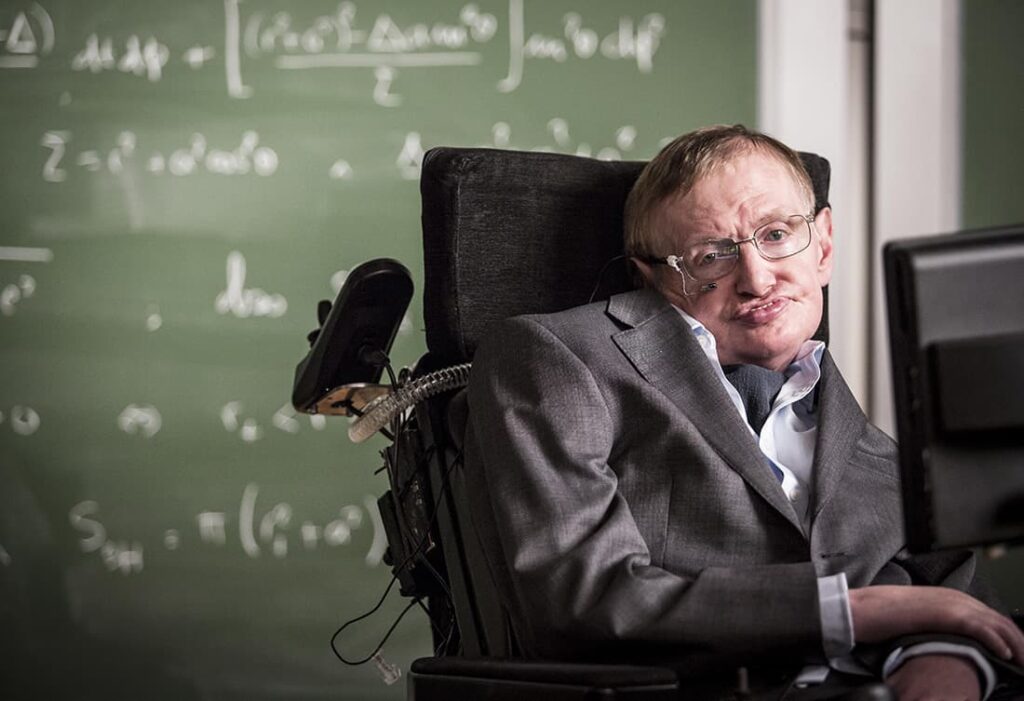- Early Life and Family Background
Stephen William Hawking was born on January 8, 1942, in Oxford, England, exactly 300 years after the death of Galileo Galilei. His father, Frank Hawking, was a medical researcher specializing in tropical diseases, while his mother, Isobel Hawking, was one of the first women to attend Oxford University. Despite the family’s modest financial situation, education and intellectual development were deeply valued.
Stephen was the eldest of four siblings and grew up in St. Albans, a town north of London. From a young age, he showed an incredible curiosity about how things worked, even though his early academic record was not particularly impressive.
- Education and Early Interests in Science
Hawking attended St. Albans School, where he was known more for his inquisitive mind than for outstanding academic performance. He developed a passion for mathematics, but his father wanted him to study medicine. Ultimately, he enrolled at University College, Oxford, in 1959 at the age of 17, choosing to study physics because mathematics was not offered at the college.
At Oxford, Hawking initially found the academic work to be easy. He enjoyed life outside of studies, including rowing. After three years, he graduated with a first-class honors degree in natural science.
He then went on to pursue graduate studies at the University of Cambridge in 1962, focusing on cosmology — the study of the universe as a whole.
- Diagnosis with ALS and Personal Challenges
In 1963, shortly after his 21st birthday, Hawking was diagnosed with amyotrophic lateral sclerosis (ALS), also known as Lou Gehrig’s disease. Doctors gave him only a few years to live. The disease gradually paralyzed him over the decades, but it did not affect his mental abilities.
Despite the grim prognosis, Hawking found new motivation in his research and personal life. He became engaged to Jane Wilde, whom he married in 1965. Her love and support played a crucial role in giving him the strength to continue his work.
- Academic Career and Scientific Contributions
4.1 PhD and Early Work
Hawking’s PhD thesis, completed in 1966, was titled “Properties of Expanding Universes.” It explored the idea that the universe had a beginning — a concept that would later play a central role in his career.
4.2 Black Holes and Hawking Radiation
One of his most famous theories was about black holes. Traditionally, black holes were thought to be regions of space from which nothing could escape. But Hawking’s revolutionary 1974 theory proposed that black holes emit radiation (now known as Hawking radiation) and could eventually evaporate and disappear.
This was groundbreaking because it connected quantum mechanics, general relativity, and thermodynamics — three pillars of modern physics.
4.3 The Big Bang and Time
Hawking also worked extensively on the Big Bang theory and the nature of time. In collaboration with Roger Penrose, he showed that Einstein’s General Theory of Relativity implied that time and space had a beginning — a point of infinite density known as a singularity.
- Public Recognition and Popular Works
Despite his physical limitations, Hawking became one of the most recognized scientists in the world.
5.1 A Brief History of Time
In 1988, he published “A Brief History of Time”, which became an international bestseller. The book explores fundamental questions about the universe in a way that was accessible to non-scientists. It stayed on the Sunday Times bestseller list for 237 weeks — a record.
5.2 Other Publications
- Black Holes and Baby Universes and Other Essays (1993)
- The Universe in a Nutshell (2001)
- The Grand Design (2010) – co-authored with Leonard Mlodinow
- Brief Answers to the Big Questions (2018) – published posthumously
- Honors and Awards
Hawking received numerous prestigious awards and honors:
- Elected Fellow of the Royal Society (1974)
- Lucasian Professor of Mathematics at Cambridge University (1979–2009), a position once held by Isaac Newton
- Presidential Medal of Freedom (2009) – the highest civilian award in the United States
- Dozens of honorary degrees and international awards
He was never awarded the Nobel Prize, partly because his theories had not been experimentally confirmed during his lifetime.
- Personal Life and Media Appearances
Stephen Hawking and Jane had three children together: Robert, Lucy, and Timothy. Their marriage eventually ended in divorce in 1995. He later married his nurse, Elaine Mason, but that marriage also ended in divorce.
Hawking made numerous media appearances and pop culture cameos, including on:
- The Simpsons
- Star Trek: The Next Generation
- The Big Bang Theory
His life was also depicted in the 2014 film “The Theory of Everything”, in which actor Eddie Redmayne portrayed him and won an Academy Award.
- Death and Legacy
Stephen Hawking passed away peacefully at his home in Cambridge on March 14, 2018, at the age of 76. Fittingly, it was also Pi Day and the death anniversary of Albert Einstein.
His ashes were interred at Westminster Abbey, near the graves of Isaac Newton and Charles Darwin, cementing his legacy as one of the greatest minds in history.

